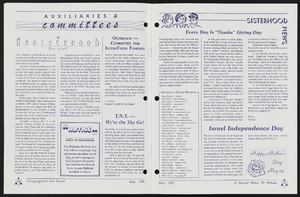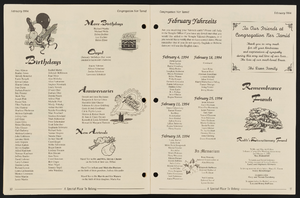Search the Special Collections and Archives Portal
Search Results
Willis Clark Evans oral history interview
Identifier
Abstract
Oral history interview with Willis Clark Evans conducted by Bernard Timberg on February 5, 1974 for the Ralph Roske Oral History Project on Early Las Vegas. In this interview, Evans discusses his father, Native American archaeologist Willis Lyman Evans, his mother, Jessie Dave Evans, his uncle, Henry "Hank" Dave as he recounts his upbringing and family history. He shares memories of family trips around the United States, hunting trips, learning traditional crafts from his father, finding artifacts, and visiting Richard "Chick" Perkins at the Lost City Museum. He also recounts stories about his mother and her Shoshone family, including stories about his uncle's experiences as a ranch worker in Northern Nevada.
Archival Collection
Duy Ngyuen (Asian Community Development Council) oral history interview conducted by Magdalena Martinez: transcript
Date
Archival Collection
Description
From the Lincy Institute "Perspectives from the COVID-19 Pandemic" Oral History Project (MS-01178) -- Community organization interviews file.
Text

Transcript of interview with David Wasserman by Barbara Tabach, October 21, 2016
Date
Archival Collection
Description
For nearly two decades between 1950 and 1970, only one dentist of Jewish ancestry was known to be licensed to practice in Nevada. That was Dr. Joe Chenin. Finally, in 1971, the steadfast and easy mannered Dr. David R. Wasserman (1944 - ) broke through the barrier to become the second Jewish dentist serving the Las Vegas community. Over the following years, Dr. Wasserman built a sizeable following and immersed himself in the Jewish community of Las Vegas. Among his achievements is his participation and leadership in the formation of Las Vegas’ first Reform Jewish synagogue, Congregation Ner Tamid. He also would be active in the Jewish Federation. In 1992, as the HIV-AIDS epidemic affected dental offices throughout the nation, Dr. Wasserman saw an opportunity to get ahead of the infection. With the help of his wife Juanita Davis-Wasserman and his father-in-law Warren Davis, he developed, patented, manufactured and distributed a disposable tip for a treatment instrument commonly found in dental offices called a tri-syringe. This disposable tip brought sanitary options and great financial fortune to Dr. Wasserman and his family. In this oral history, Dr. Wasserman reflects on his joy of living in Las Vegas. He is a highly regarded dentist and leader in the Jewish community.
Text

Transcript of interview with Walter Dane by Ann Clark, March 11, 1978
Date
Archival Collection
Description
On March 11, 1978, Ann K. Clark interviewed her step grandfather, tire repairman Walter Dane, (born August 10th, 1914 in West Barnett, Vermont) in her, the interviewer’s, home in North Las Vegas. Also present during the interview is the interviewer’s mother, Marie Dane. Walter relocated to Indian Springs in 1930 before settling in Las Vegas in 1943. In 1968 he moved to Utah, where he resided at the time of this interview. Well-traveled, Walter discusses his many moves over the years. Ultimately, this interview covers the growth and development of the Las Vegas and Indian Springs areas.
Text

Timothy Dickhudt oral history interview: transcript
Date
Archival Collection
Description
Oral history interview with Timothy Dickhudt conducted by Barbara Tabach on March 13, 2018 for the Remembering 1 October Oral History Project. In this interview, Timothy Dickhudt discusses his move to Las Vegas, Nevada in 2017 for a fellowship at the University Medical Center in Southern Nevada (UMC). He describes the night of the October 1, 2017 mass shooting, how he was called into work almost immediately after he arrived home from his shift, and his gradual understanding that a mass shooting had occurred on the Las Vegas Strip. Dickhudt also talks about operating on a family acquaintance from his home state of Minnesota who had attended the concert.
Text

Transcript of interview with Esther Toporek Finder by Barbara Tabach, June 8, 2016
Date
Archival Collection
Description
Esther Toporek Finder is a professor of psychology and has lived in Las Vegas, Nevada since 2010. She was born May 28, 1953, in Chicago, Illinois, and moved to Washington D.C. in 1979 after graduating with her Masters from the University of Chicago. While in Washington D.C, Finder was able to jump start her career as an oral historian recording Holocaust survivor stories with the U.S Holocaust Memorial Museum and the Shoah Foundation. Esther Finder is a second generation Holocaust survivor. Her passion for Holocaust education and its representation in society has led her to many opportunities to teach, facilitate, educate, create and contribute to many survivor oriented groups such as The Generation After where she was President for 15 years, the Holocaust Era Assets Conference as representation of the American survivor community, as well as the creation of the Generations of the Shoah International group in October 2002. When Finder moved to Las Vegas, she quickly and deeply involved herself in the Las Vegas Holocaust survivor community. She has been integral with Nellis Air Force Base?s Days of Remembrance, the opening the Generations of Shoah Nevada Chapter, and partnering with the World Federation of Jewish Child Survivors of the Holocaust and Descendants to bring conferences to the Las Vegas Valley. In addition, she has been an organizer of commemoration programs for students attending UNLV and schools within the Clark County School District. Her involvement with the Governor?s Advisory Council on Education Relating to the Holocaust and the television series Eyewitness to History have highlighted the Holocaust survivors living in Las Vegas. In this interview, Finder discusses her childhood as well as the paths that led her to realize her passion for the Holocaust survivor community and her deep association with the community. She shares her experiences interviewing survivors and second generation survivors giving a deeper insight into the stories that they have shared with her over the years. In addition, she reflects on her long reach within the survivor community and brings to light the foundation of family being a survivor gives. Finder highlights the traveling, teaching and community service opportunities she has had over the years while enlightening people about the importance of countering hate through education.
Text




